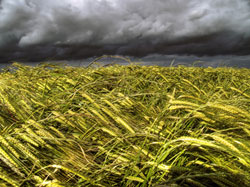Self-healing wheat
The EC-funded FUCOMYR project concentrated on the development of a new "protective" approach: for wheat that could resist infection from the fusarium fungi. This pathogenic fungal species can produce mycotoxins, which pose serious health risks to the consumers. Project partners therefore sought to employ bioengineering techniques to develop new breeds of wheat, armed with the necessary genetic and protein tools to fight off infection. Isolating the candidate genes that could be used for the purposes of inducing resistance formed a substantial part of the FUCOMYR project. The BBSRC John Innes Centre studied the genetic differences of wheat breeds that are naturally fusarium-resistant and those that are susceptible. Researchers created a double haploid population of two such breeds, totalling 114 lines and examined the level of resistance in each. The studies resulted in a series of genetic markers associated with resistance loci. The identification of these markers should reduce the overall processing time of breeding programmes aimed at isolating fusarium resistant breeds. These new breeds could result in a new generation of agricultural products, reducing pesticide use while ensuring the health and safety of the consumer.







